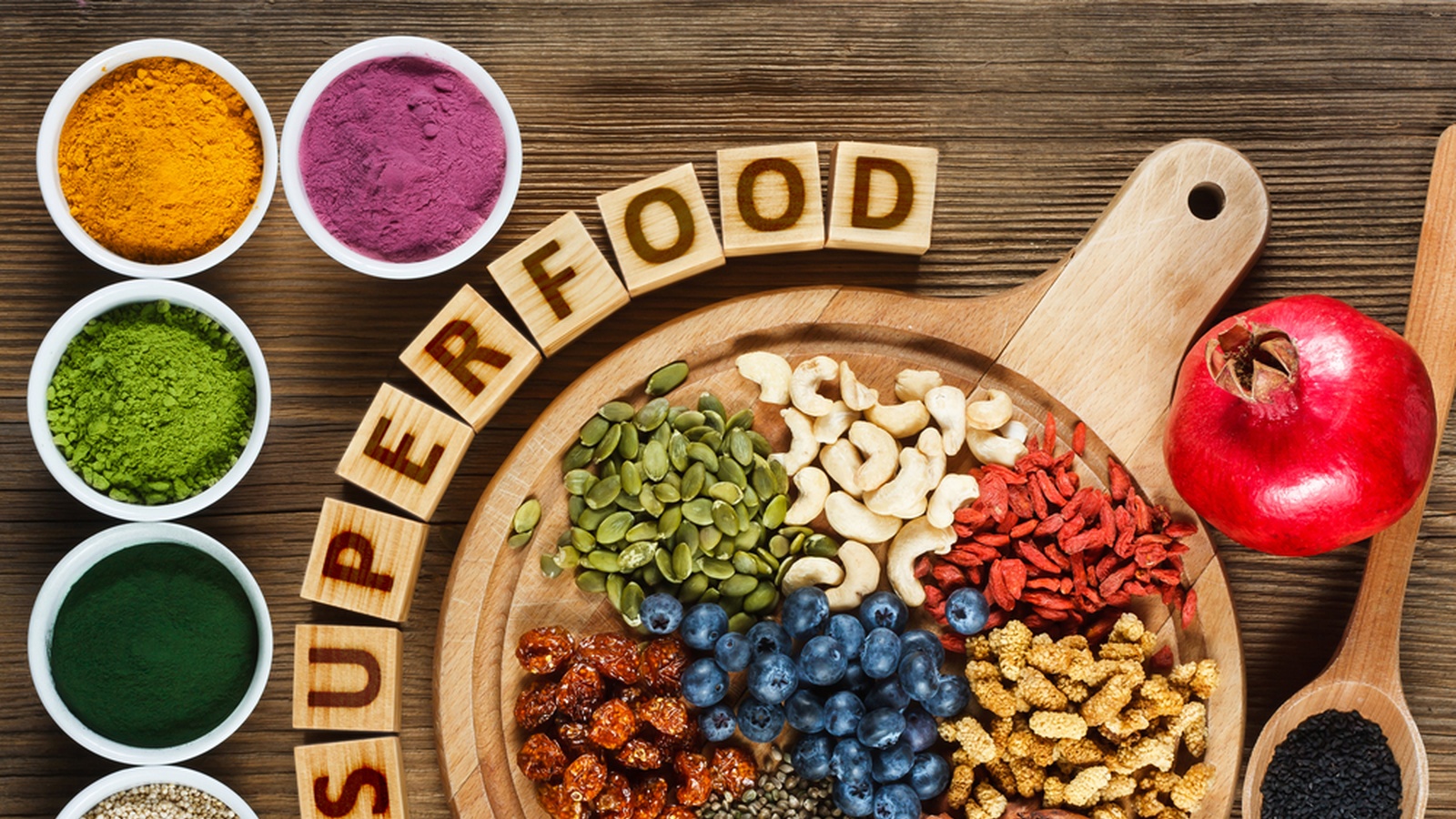
In our quest for good health, it’s important to eat a variety of nutritious foods every day. While the term “superfood” may be a marketing ploy, there are certain foods that are undeniably rich in nutrients and have the potential to positively impact our health. These foods, often referred to as superfoods, can provide numerous benefits, from reducing the risk of chronic diseases to aiding weight loss. In this article, we will explore the power of superfoods and discuss 16 nutrient-packed options that deserve the esteemed title.
1. Dark Leafy Greens
1. Dark Leafy Greens

Dark leafy greens, such as kale, spinach, and Swiss chard, are nutritional powerhouses. They are packed with essential vitamins and minerals like vitamin A, vitamin C, and iron. These greens are also rich in antioxidants, which help fight inflammation and oxidative stress in the body.
Their high fiber content supports healthy digestion and can aid in weight management. Additionally, dark leafy greens have been linked to a reduced risk of chronic illnesses, including heart disease and certain types of cancer.
To incorporate dark leafy greens into your diet, consider adding them to salads, smoothies, or stir-fries. Aim to consume a variety of these greens for maximum nutritional benefits.
2. Berries
2. Berries

Berries, such as strawberries, blueberries, and raspberries, are not only delicious but also incredibly nutritious. They are packed with antioxidants, including anthocyanins, which give them their vibrant colors. These antioxidants have been shown to reduce the risk of heart disease, cancer, and other inflammatory conditions.
Furthermore, berries are a great source of dietary fiber and can support digestive health. They also have a low glycemic index, which means they have a minimal impact on blood sugar levels and can be suitable for individuals with diabetes.
To enjoy the benefits of berries, incorporate them into your diet by adding them to yogurt, oatmeal, or smoothies. You can also enjoy them as a snack on their own.
3. Green Tea
3. Green Tea

For centuries, green tea has been celebrated for its health benefits. It is rich in polyphenols and antioxidants, especially EGCG (epigallocatechin gallate), which have been shown to protect against chronic diseases, including heart disease and certain types of cancer.
Green tea has also been associated with weight loss, as it may increase metabolism and fat oxidation. Additionally, its antioxidants can have anti-aging effects, promoting youthful skin.
To enjoy the power of green tea, steep it in hot water for a few minutes and consume it plain or with a slice of lemon. It can be a refreshing alternative to sugary beverages.
4. Eggs
4. Eggs

Eggs have long been a staple in many diets, and for good reason. They are a complete protein source, meaning they contain all essential amino acids. Eggs also provide important nutrients, including vitamins A, D, E, and B12.
Contrary to previous beliefs, consuming eggs does not increase the risk of heart disease or diabetes. In fact, studies have shown that eggs may improve blood lipid profiles and provide antioxidant properties.
Eggs can be prepared in various ways to suit your taste. Whether you prefer them boiled, scrambled, or in omelets, they are a versatile and nutritious addition to any meal.
5. Legumes
5. Legumes

Legumes, including beans, lentils, and chickpeas, are powerhouse foods packed with vitamins, minerals, and fiber. They are an excellent plant-based source of protein and are low in fat, making them an ideal choice for vegetarians and vegans.
Studies have shown that incorporating legumes into your diet can have numerous health benefits. They can help manage diabetes by stabilizing blood sugar levels and improving insulin sensitivity. Legumes also support heart health by lowering blood pressure and cholesterol levels.
To enjoy legumes, consider adding them to soups, stews, or salads. You can also use them in plant-based recipes as a meat substitute.
6. Nuts and Seeds
6. Nuts and Seeds
Nuts and seeds are convenient and nutritious snacks that can be easily incorporated into your diet. They are rich in healthy fats, fiber, and various essential nutrients.
Regular consumption of nuts and seeds has been linked to a reduced risk of heart disease, inflammation, and certain types of cancer. They also provide satiety, making them a great option for weight management.
Almonds, walnuts, chia seeds, and flaxseeds are just a few examples of nuts and seeds that you can enjoy as a snack or add to your meals. Just be mindful of portion sizes as they are calorie-dense foods.
7. Fish
7. Fish

Fish, particularly fatty fish like salmon, mackerel, and sardines, are excellent sources of omega-3 fatty acids. These essential fats have been shown to reduce inflammation, improve brain function, and support heart health.
Regular consumption of fish has been associated with a decreased risk of various chronic diseases, including heart disease, stroke, and certain types of cancer.
Aim to include fish in your diet at least twice a week. Grilling, baking, or steaming fish are healthy cooking methods that can preserve their nutritional value.
8. Whole Grains
8. Whole Grains

Whole grains, such as quinoa, brown rice, and oats, are unprocessed grains that retain their bran, germ, and endosperm. These components provide essential nutrients, including fiber, vitamins, minerals, and antioxidants.
Incorporating whole grains into your diet can promote digestive health, support weight management, and reduce the risk of heart disease, type 2 diabetes, and certain cancers.
You can enjoy whole grains as a side dish, in salads, or as part of main courses. Choose whole grain options when purchasing bread, pasta, and cereal products.
9. Yogurt
9. Yogurt

Yogurt is a fermented dairy product that is rich in probiotics, which are beneficial bacteria that support gut health. It is also a good source of protein, calcium, and vitamins B2 and B12.
The probiotics in yogurt can help maintain a healthy balance of bacteria in the gut, improving digestion and boosting the immune system. Regular consumption of yogurt has also been associated with a reduced risk of type 2 diabetes and heart disease.
When choosing yogurt, opt for plain or Greek yogurt with no added sugars. You can enhance the flavor by adding fruits, nuts, or seeds.
10. Avocado
10. Avocado

Avocado is a unique fruit that is known for its high content of monounsaturated fats. These healthy fats can help reduce LDL cholesterol levels and promote heart health.
Avocados are also rich in vitamins C, E, K, and B6, as well as potassium and fiber. They provide a creamy texture to dishes and can be a healthy substitution for mayonnaise or butter in certain recipes.
Adding sliced avocado to salads, spreads, or smoothies can be a delicious and nutritious way to enjoy this superfood.
Power of Superfoods – A Detailed Table Breakdown
| Superfood | Benefits |
|---|---|
| Dark Leafy Greens | High in nutrients, reduce risk of chronic illnesses |
| Berries | Antioxidants, reduce risk of heart disease and cancer |
| Green Tea | Rich in antioxidants, protect against chronic diseases |
| Eggs | High-quality protein, antioxidants, nutrients without increasing risk of heart disease or diabetes |
| Legumes | Vitamins, protein, fiber, benefits for diabetes, blood pressure, cholesterol, and weight maintenance |
| Nuts and Seeds | Healthy fats, fiber, reduce risk of heart disease and inflammation |
| Fish | Omega-3 fatty acids, reduce inflammation, improve brain function, support heart health |
| Whole Grains | Fiber, vitamins, minerals, antioxidants, reduce risk of heart disease, diabetes, and certain cancers |
| Yogurt | Probiotics, protein, calcium, reduce risk of type 2 diabetes and heart disease |
| Avocado | Monounsaturated fats, reduce LDL cholesterol, promote heart health |
Frequently Asked Questions (FAQ) about the Power of Superfoods
Q: Can superfoods cure diseases?
A: While superfoods are nutrient-dense and can support good health, they do not have the power to cure diseases on their own. A balanced diet, regular exercise, and medical treatments are important for disease management.
Q: How should I incorporate superfoods into my diet?
A: You can incorporate superfoods into your diet by adding them to your meals, snacks, or smoothies. Aim for variety and moderation to ensure a well-rounded and balanced approach.
Q: Are superfoods more expensive than regular foods?
A: Some superfoods can be more expensive than regular foods. However, it’s important to note that a nutritious diet can be achieved within a budget by choosing local, seasonal, and affordable options.
Q: Can superfoods help with weight loss?
A: Superfoods alone are not a magic solution for weight loss. However, they can be part of a balanced and calorie-conscious diet that supports weight management. Regular exercise and portion control are also essential for weight loss.
Q: Are there any potential side effects of consuming superfoods?
A: Superfoods are generally safe to consume when incorporated into a balanced diet. However, individuals with specific allergies or medical conditions should exercise caution and consult with a healthcare professional if needed.
Q: Do I need to eat superfoods every day?
A: While superfoods are beneficial for your health, you do not need to consume them every day. A varied and balanced diet that includes a mix of nutrient-rich foods is key to overall good health.
Q: Can children consume superfoods?
A: Yes, children can consume superfoods as part of a well-rounded diet. However, it’s important to introduce new foods gradually and ensure age-appropriate portion sizes.
Q: Are there any superfoods that are particularly good for the skin?
A: Yes, certain superfoods can be beneficial for the skin. Examples include berries, which are rich in antioxidants, and avocados, which provide healthy fats and vitamins that promote skin health.
Q: Can superfoods replace medical treatments?
A: No, superfoods cannot replace medical treatments. While they can support good health, it’s important to follow medical advice and treatment plans recommended by healthcare professionals.
Q: Are there any superfoods that are suitable for vegetarians and vegans?
A: Many superfoods, such as legumes, nuts, seeds, and dark leafy greens, are suitable for vegetarians and vegans. These plant-based options provide essential nutrients and can be incorporated into various vegetarian and vegan dishes.
Top Reviews on the Power of Superfoods
“Since incorporating more superfoods into my diet, I have noticed a significant improvement in my overall health. I feel more energized, and my skin has never looked better!” – Sarah M.
“The power of superfoods is undeniable. I have been consuming them regularly for years, and I believe they have played a significant role in preventing chronic diseases and maintaining my wellbeing.” – John R.
“As a vegetarian, I rely on superfoods to ensure I am getting all the necessary nutrients. They have made a significant difference in my health and have made me feel more confident in my dietary choices.” – Emily G.
Conclusion
While the term “superfood” may be a marketing invention, there is no denying the power of nutrient-rich foods. Incorporating a variety of superfoods, such as dark leafy greens, berries, and green tea, into your diet can provide numerous health benefits, from reducing the risk of chronic diseases to promoting weight loss.
Remember, there is no one-size-fits-all approach to nutrition, and a balanced diet that includes a variety of foods is key to good health. So why not harness the power of superfoods and enjoy the many benefits they have to offer?
Check out our other articles for more insights into the world of nutrition and wellness!